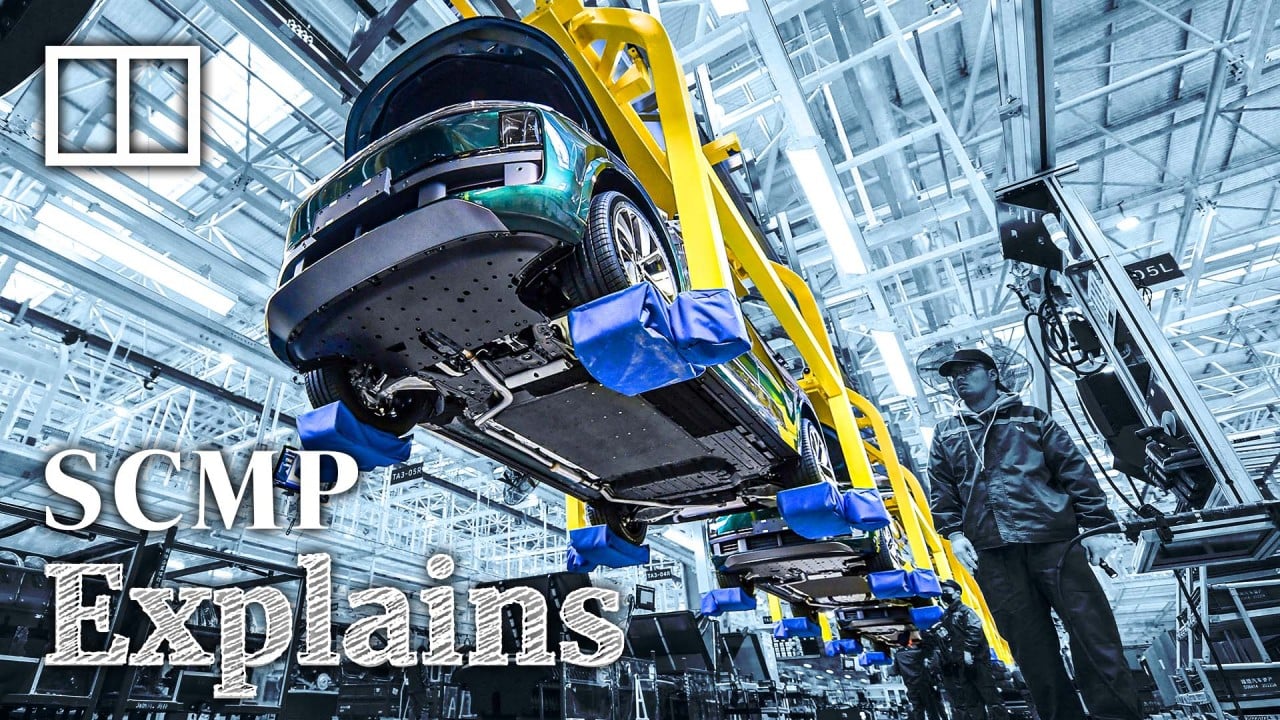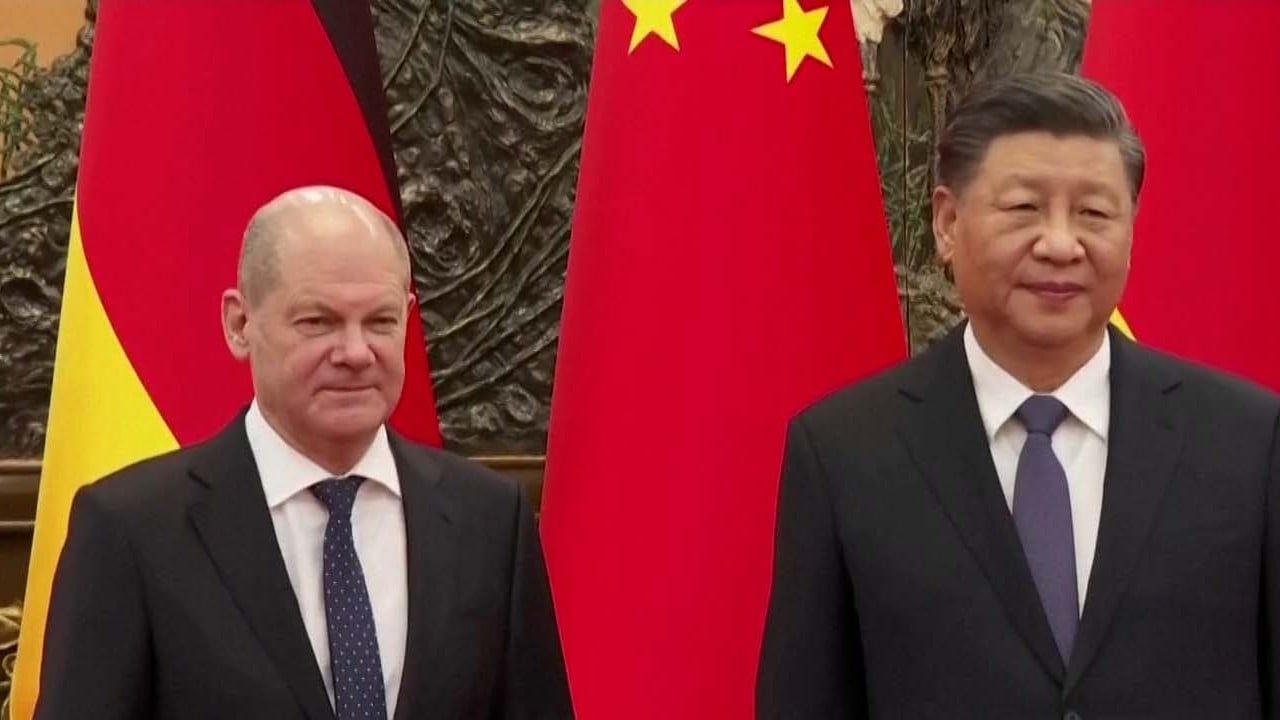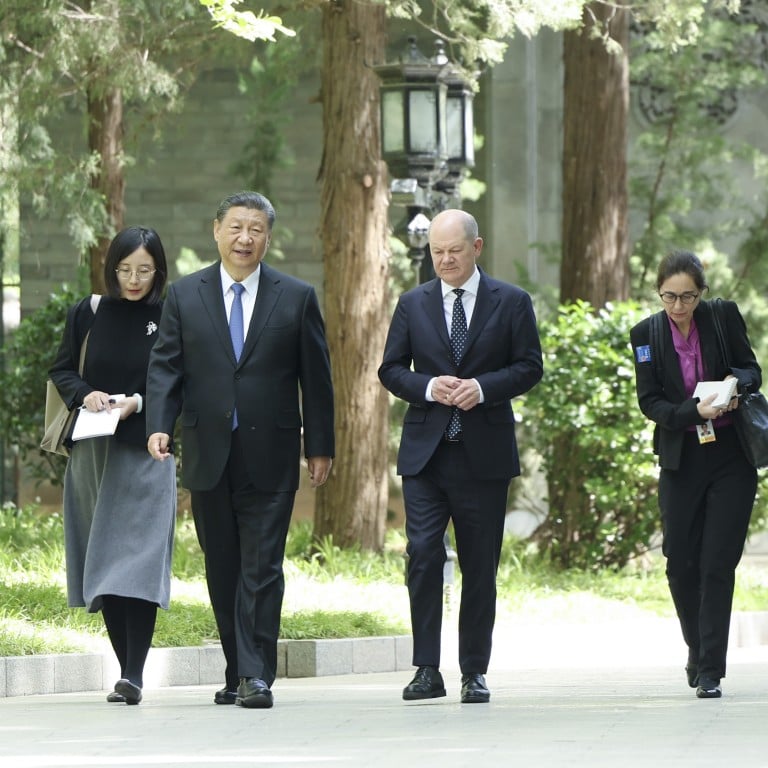
China has no ‘fundamental’ conflict of interest with Germany, Xi Jinping tells Olaf Scholz
- Chinese leader tells the German chancellor that neither side poses a security threat to the other and they should continue to strengthen their economic ties
- Scholz’s visit comes amid growing concern in Europe about economic ties with Beijing, which have prompted the bloc to launch a ‘de-risking’ strategy
“The industrial and supply chains of China and Germany are deeply embedded, and the markets of the two countries are highly interdependent. Mutually beneficial cooperation between China and Germany is not a ‘risk’, but a guarantee of the stability of bilateral relations and an opportunity to create a future,” Xi said, according to a statement from the Chinese foreign ministry.
He also said both sides should be “wary of the rise of protectionism and insist on looking at production capacity issues objectively and dialectically proceeding from economic laws and from a market and global perspective”.
Xi added China-German relations “transcend the scope of bilateral relations” and have an “important impact” on the world, and the two countries should develop relations with a “long-term and strategic” perspective.
In China, Germany’s Olaf Scholz seeks ‘open and fair’ competition, cooperation
“There is no fundamental conflict of interest between China and Germany and they do not pose a security threat to each other … As long as both sides adhere to mutual respect, seek common ground while reserving differences, communicate and learn from each other, and achieve win-win cooperation, relations between the two countries will continue to develop steadily.”
It is Scholz’s second visit to the country in less than 18 months. It follows the launch of a European Union “de-risking” strategy to reduce the bloc’s economic dependence on China and anti-subsidy probes into products such as electric vehicles and solar panels amid claims they are flooding the market with cheap goods.
Scholz, who also visited Shanghai and Chongqing on his visit, was accompanied by a large business delegation including executives from Siemens, Bayer, Mercedes-Benz, BMW and Merck Group.
In Shanghai, Scholz said he welcomed Chinese vehicles sales, but stressed the need for fair competition and warned against dumping and overcapacity.
According to state broadcaster CCTV, Scholz told Xi Germany opposed protectionism and is willing to strengthen relations and deepen cooperation “in various fields”. He added Germany was willing to play its part in promoting the development of China-EU relations.
He said Germany “does not endorse confrontation”, adding: “It is willing to strengthen communication and coordination with China to jointly respond to global challenges such as climate change, and is committed to safeguarding the multilateral international order and promoting world peace and development.”
The Chancellor later met Premier Li Qiang, who told him China hoped to increase “mutual understanding” while urging Germany to ease hi-tech restrictions against China and provide a fair business environment for Chinese companies.
He also called on the EU to carefully weigh its trade remedies, according to CCTV.
Germany is reportedly considering restricting exports to China of chemicals essential for chip-making amid a push by the United States to get more countries to join its efforts to limit Beijing’s access to advanced technology.
The pair also attended a panel for business leaders from the two countries, where Li said the Chinese economic recovery was “consolidating”. Tuesday saw China announce better-than-expected growth of 5.3 per cent for the first quarter of the year.
The premier also pledged to do more to address foreign investors’ concerns, saying: “China will continue to reduce the negative list for foreign investment access and implement national treatment for foreign-invested enterprises.
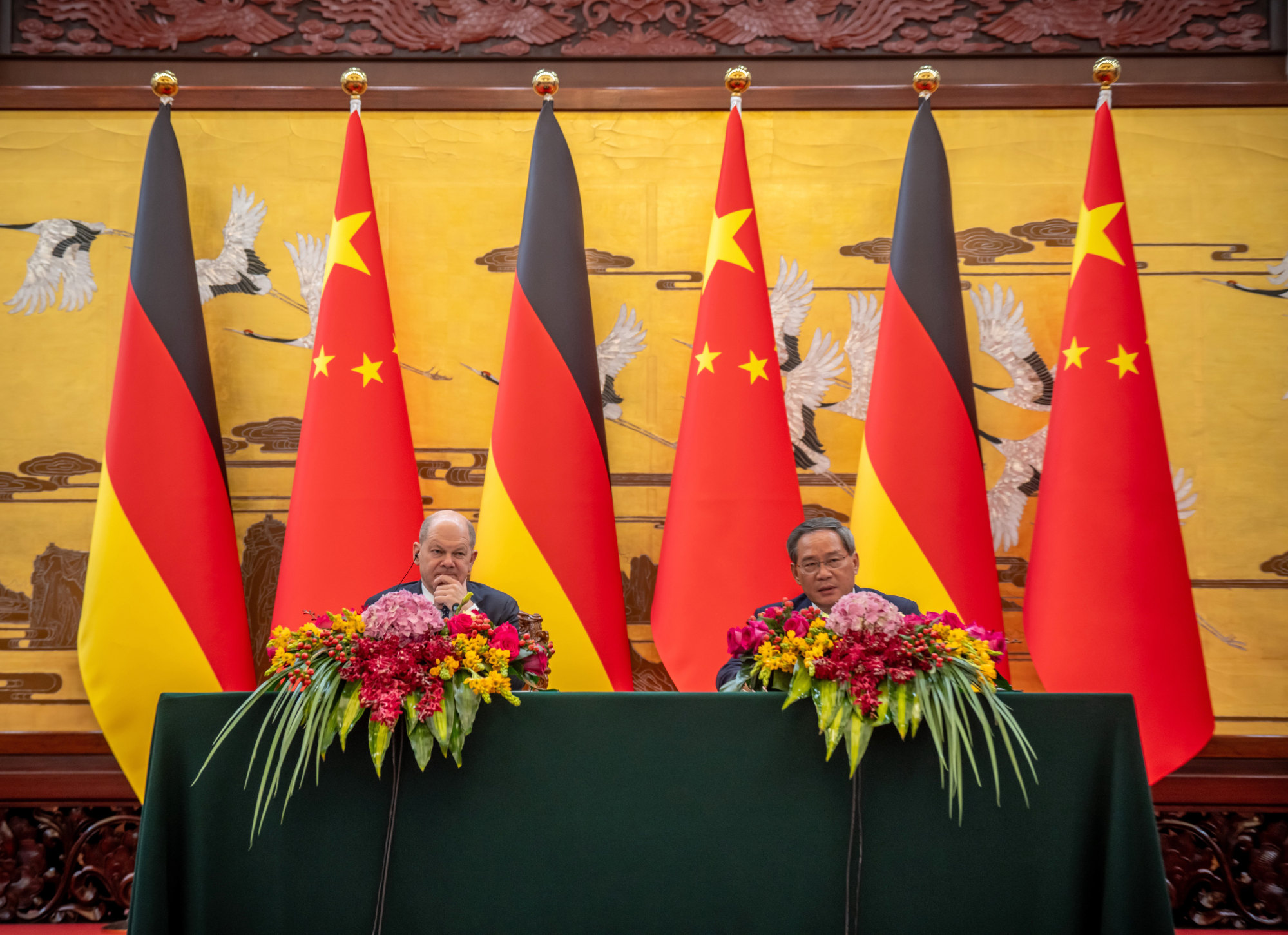
“We are constantly adjusting and optimising arrangements for data and cross-border flows, and will continue to listen to the opinions of foreign-funded enterprises on a regular basis and actively respond to and resolve their reasonable demands.”
Two recent surveys by the German Chamber of Commerce in China found around two thirds of the German companies that took part believed China’s current economic slowdown was temporary. But they complained about unfair competition and highlighted their concerns about regulations that lack transparency and rising geopolitical tensions.
Scholz has been trying to strike a balance between the interests of German business and the EU’s tougher approach to China.
His last visit took place right after Xi secured his historic third term as party chief, prompting criticism from his fellow EU members about his apparent willingness to strike deals despite growing concerns about the direction China was taking.
He has also been promoting the visit on his newly opened TikTok account, which features videos of him touring German factories in China.
The social media platform, owned by Chinese firm ByteDance, is under investigation by the EU and could face hefty fines if it is found to have breached online content rules aimed at protecting children and ensuring transparent advertising.
China and Switzerland in push for Russia to join Ukraine peace summit
Facing low approval ratings and a dire economy at home, many believe Scholz is trying to boost economic links with China ahead of next year’s federal election.
But China’s strong ties with Russia continue to cast a long shadow over relations with Germany, despite Beijing’s insistence it is neutral in the Ukraine war.
These claims have been greeted with considerable scepticism within the EU, which has warned China not to supply arms to Russia and criticised it for providing economic support.
Scholz told Xi the “rearmament of Russia” threatens European security and said he wanted to discuss how they can work towards a “just peace”, Germany’s DW News reported.
China has said it will not give any material support to Russia’s war effort and condemned the EU’s “unilateral” sanctions, whose targets include Chinese companies.
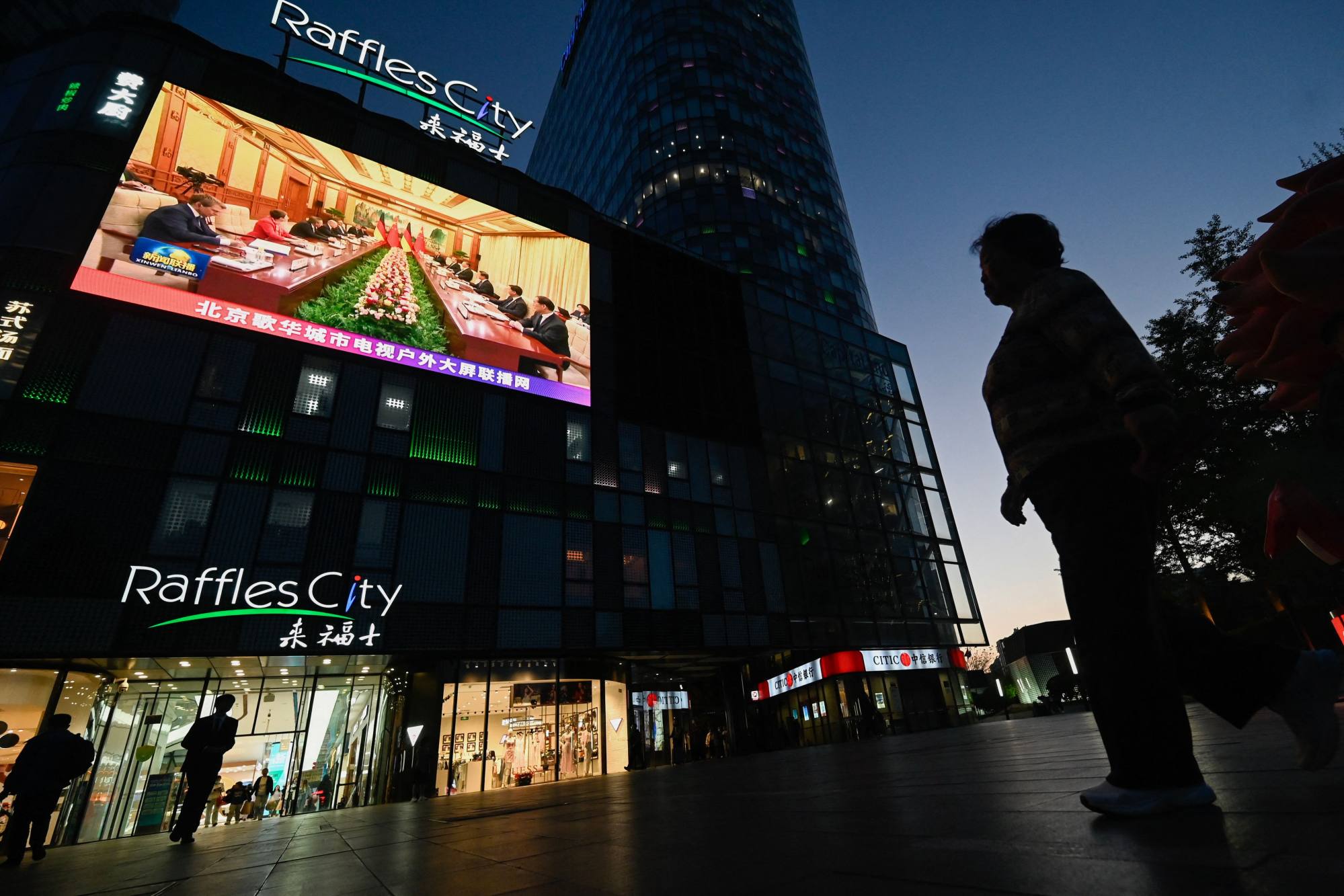
In a post on X, formerly Twitter, Scholz said he had asked Xi to rein in Russia.
“China’s word carries weight in Russia. I have therefore asked President Xi to influence Russia so that Putin finally ends his insane campaign, withdraws his troops and ends this terrible war,” he wrote.
CCTV reported that Xi told Scholz that China is committed to peace in Ukraine and is willing to discuss international peace talks “recognised by both sides”.
“China is not a party or participant in the Ukraine crisis, but it has been promoting peace talks in its own way … All parties should work together to restore peace at an early date,” he said.
Xi and Scholz also urged de-escalation of the Israel-Palestine conflict and continued “deep exchanges on a range of topics” during a walk in the grounds of the Diaoyutai State Guest House in Beijing, according to CCTV.

 - Kawala Xie.jpg?itok=NogZcyZ-&v=1661304068)
